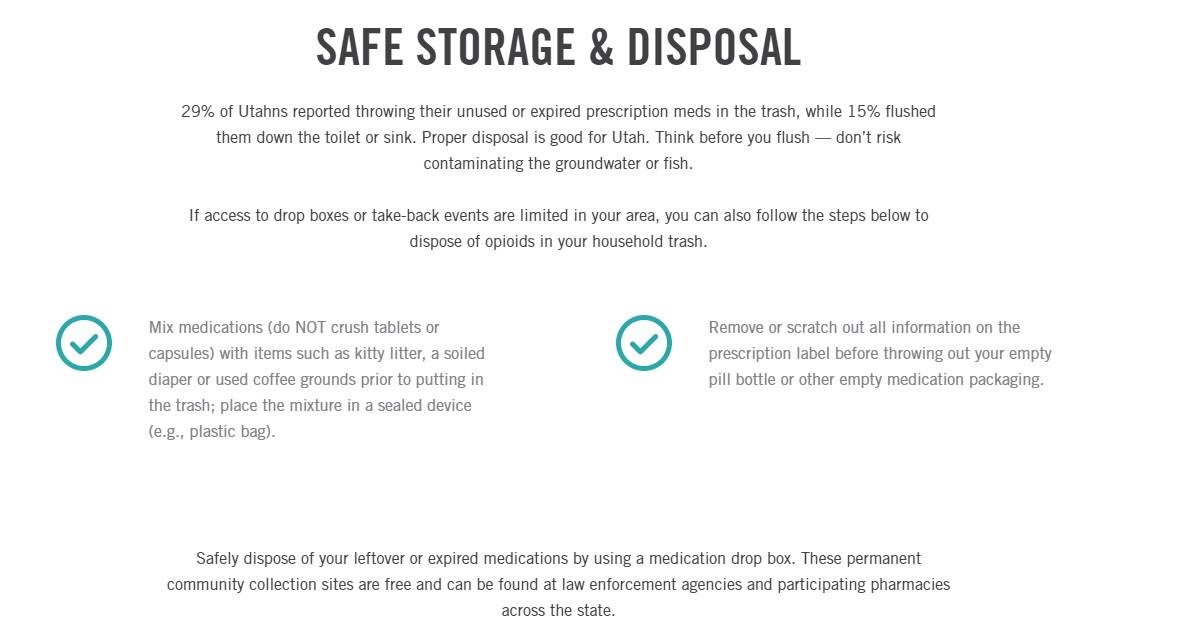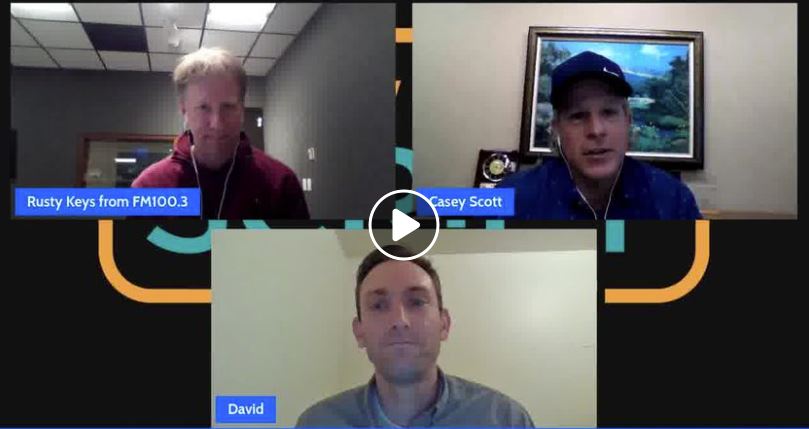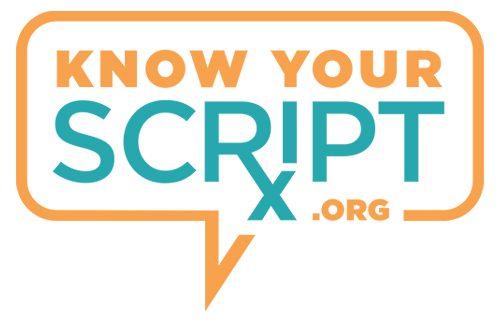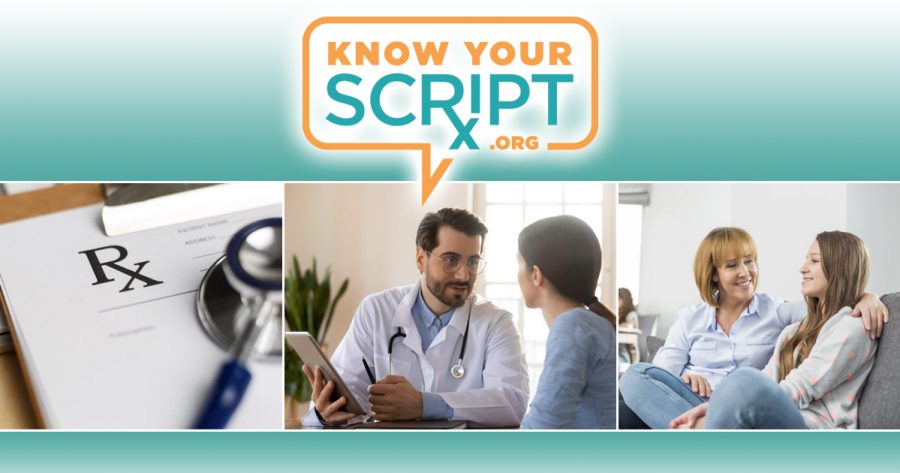KNOW YOUR SCRIPT
KNOW YOUR SCRIPT primarily focuses on educating and empowering parents to know what part they play in having a conversation with their children about the dangers of prescription medication. Additionally, targeting caregivers to advocate for their children, parents and selves.
– Rep. Rosemary Lesser, Utah House of Representatives, District 10
– Bryce Sherwood, Dir. Of Health Promotion, Weber-Morgan Health Department
– Summer Finch, Community Health Educator, Weber-Morgan Health Department
Watch Casey Scott’s interview with Dr. Annie Deming, Clinic Director of Behavioral Health at Intermountain Primary Children’s Hospital, as they discuss the relationship between prescription drugs and adolescents. Gain valuable resources through the knowyourscript.org website by learning safe alternatives, questions to ask your doctor, and key guidance for parents and teens.
Tune in to hear Kim Compagni, Assistant VP, Pain Management at Intermountain Healthcare speak with Casey Scott about treatment for pain management. They discuss effective ways to treat pain using both medication and an holistic approach.
Tune in to hear Debbie Nelson from Maple Mountain Mental Health and Wellness, and her conversation with Casey Scott about prescription drug use. Listen to their insightful and positive approach on how to have an honest conversation with your doctor, as well as how to live a healthy lifestyle.
As part of the ‘Know Your Script’ Social Series, watch Casey Scott (Project Recovery Host) interview local artist Mike Green, as they discuss the challenges of prescription drug use and the resources ‘Know Your Script’ can provide families.
As we kick off Know Your Script Month, we are launching Part 1 of our Social Series featuring Casey Scott, Project Recovery Host’s, dynamic interview with Alema Harrington, Sportscaster & Counselor at ARDU Recovery Centers.
We want patients going into their doctors, dentists or pharmacies to know their treatment options; to be comfortable asking questions about the risks and benefits of prescription drugs; and to feel confident that all alternatives have been considered before deciding on a prescription medication.


Rusty Keys, Casey Scott, and David Watkins discuss ‘Know Your Script’ and talk about the safe handling and conversation starters we can have with our children regarding prescription drug use. Learn more at KnowYourScript.org
David Watkins and Russ Porter talk about opening up the conversation surround substance abuse
– Understand potential interaction with other drugs and appropriate dosage.
– Understand the potential risk of addiction.
– Talk to your health care provider about risks, proper dosage and alternative therapies.
– Talk to your children about risks of misuse and abuse of prescription medications.
– The importance of safely storing medication
– How to properly dispose medications
– The importance of not sharing medications with family or friends
Ways to Protect Your Teen
– Speak to your teen about prescription medicines — do not presume that illegal drugs are the only threat, and remind them that taking someone else’s prescription or sharing theirs with others is illegal.
– Encourage your teen to ask you or a doctor about the negative side effects of a prescribed medicine, how to watch for them, and what to do if a negative effect is suspected.
– Alert your family physician that you’re concerned and ask him or her to speak to your teen about the importance of proper use of prescription medicines.
– Keep prescription medicines in a safe place and avoid stockpiling them.
– Promptly and properly dispose of any unused prescription medicines.
– Provide a safe and open environment for your teen to talk about abuse issues.
– Monitor your teen’s use of the internet, especially for any illegal online purchases.
1 How am I supposed to take it?
2 Are there alternatives?
3 Is there a risk for dependency or addiction?
4 What do I do if I miss a dose?
5 Should I avoid anything while taking this medication?
Patients can take steps to ensure that they use prescription medications appropriately by:
· Following the directions as explained on the label or by the pharmacist
· Being aware of potential interactions with other drugs as well as alcohol
· Never stopping or changing a dosing regimen without first discussing it with the doctor
· Never using another person’s prescription and never giving their prescription medications to others
· Storing prescription stimulants, sedatives and opioids safely
· Do not take medication that hasn’t been prescribed to you by a doctor or dentist.
· Do not share prescription medications with others.
· Proper disposal is good for Utah. Think before you flush — don’t risk contaminating the groundwater or fish.
· 29% of Utahns reported throwing their unused or expired prescription pain meds in the trash, while 15% flushed them down the toilet or sink.
· If access to drop boxes or take-back events are limited in your area, you can also follow the steps below to dispose of opioids in your household trash.
o Mix medications (do NOT crush tablets or capsules) with items such as kitty litter, a soiled diaper or used coffee grounds prior to putting in the trash; place the mixture in a sealed device (e.g., plastic bag).
o Remove or scratch out all information on the prescription label before throwing out your empty pill bottle or other empty medication packaging.
· Safely dispose of your leftover or expired opioids by using a medication drop box. These permanent community collection sites are free and can be found at law enforcement agencies and participating pharmacies across the state.
· Find a drop box closest to you at knowyourscript.org.
Recognize the signs of abuse or addiction.
Signs and symptoms of prescription drug misuse or abuse can be physical, behavioral and/or psychological.
These are some of the things to look for:
– Taking higher doses or taking more frequently than prescribed
– “Craving” just one more pill or refill
– Running out of prescriptions too soon
– Compulsively seeking and using prescription medications despite harmful consequences
– Taking the prescription medication for its psychological effects or to feel high
– Taking the opioid for reasons other than why it was prescribed
– Continuously “losing” prescriptions and requesting replacements
– Mixing pills and alcohol
– Seeking prescriptions for more than one injury or with multiple doctors or pharmacists
– Exhibiting abnormal behaviors, hostility, excessive mood swings or sudden personality changes
– Withdrawing from friends, family or social activities
– Losing appetite and extreme changes in weight
– Neglecting responsibilities
– Distracted, unable to focus, confused
– Change in sleep patterns
– Poor decision making
If you or someone else you know is struggling with prescription drug misuse and shows these signs, get help now.

References
1. Utah Prevention Needs Assessment
2 Partnership at Drugfree.org. 2012 Partnership Attitude Tracking Study
4. The Partnership at Drugfree.org. The Parent Toolkit
5. health.utah.gov/vipp/teens/prescription-drug-overdose/
6. Hatsukami DK, Fischman MW. Crack cocaine and cocaine hydrochloride: Are the differences myth or reality. JAMA 276:1580-1588, 1996.
7. Krohn MD, Lizotte AJ, Perez CM. The interrelationship between substance use and precocious transitions to adult statuses. J Health Soc Behav 38(1):87-103, 1997.
8. Fowler JS, Volkow ND, Kassed CA, Chang L. Imaging the addicted human brain. Sci Pract Perspect 3(2):4-16, 2007.

